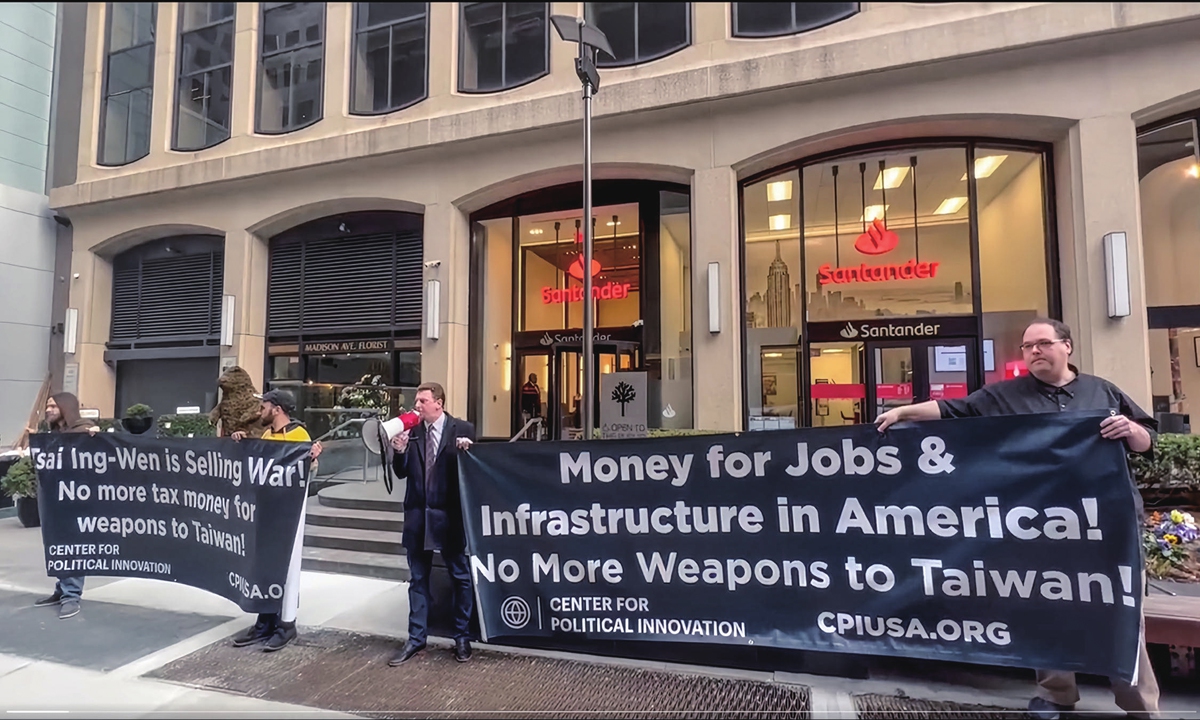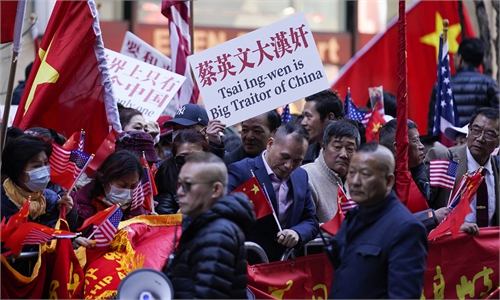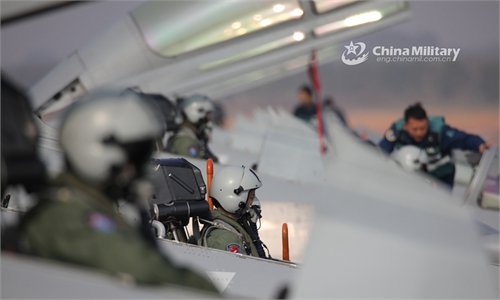
US anti-war organization Center for Political Innovation protests against Taiwan regional leader Tsai Ing-wen's transit in New York on March 29. Photo: Courtesy of Caleb Maupin
Editor's Note:
Taiwan regional leader Tsai Ing-wen may meet with US House Speaker Kevin McCarthy during her "stopover" in the US on her way back from Central America. On March 29, American anti-war organization Center for Political Innovation (CPIUSA) protested against Tsai's transit in New York and shouted out loudly "China is not our enemy!" What's the motivation behind this protest? How do the anti-war forces in the US think about US provocation on the Taiwan question? Caleb Maupin (Maupin), ideological leader of CPIUSA, shared his views with Global Times (GT) reporter Wang Zixuan in an interview.
GT: What objectives did you want to achieve by organizing this protest?
Maupin: Right now, the US is falling apart - our trains are derailing, our water is not being properly purified, our power plants are collapsing, our roads and bridges are crumbling. The American people do not want war. The polls show that they don't want more foreign interventions and don't want the US military to attack more countries. Our leaders are hosting Tsai Ing-wen and essentially working with her to promote war against Beijing. She came to the US to beg for more weapons, more provocations and more supports to antagonize the people of the Chinese mainland.
As patriotic Americans who love our country and want to make life better, it is our necessity to oppose this. We need to call out what was going on. The politicians and the billionaires that were shaking hands with her do not represent the American people. The American people want jobs, schools and healthcare, not more wars, so it was necessary to show her the real America, not the dog-and-pony show that the billionaires were putting on for her behind closed doors.
GT: Why does the US repeatedly provoke China on the Taiwan question? If Tsai meets McCarthy, what impacts will be brought on the cross-Straits situation and on US-China relations?
Maupin: We're facing a long-term economic crisis in the US. Things have never really gotten better since 2008. Now things are starting to fall apart once again, we just saw the collapse of the Silicon Valley Bank and other banks. So they want to scapegoat China. They want to say this is all China's fault. On top of that, some of the big corporations see China as a competitor. They want people to buy products from American corporations but not from China. For example, rather than engaging in fair competition and trying to get Apple to make better phones, they go around the world whipping up hysteria against Huawei, and have imposed sanctions in the chips market. They're doing this everywhere.
That is the exact opposite view when I listen to Chinese leaders, they don't want a competition with the US. They want cooperation between companies and universities. So this is a competition that doesn't need to happen. But essentially, we have a group of wealthy people that run the US who want to keep the rest of the world poor, so that they can stay rich. In 1949, the Communist Party of China broke out that global setup called imperialism, and they launched a path of independent socialism. Now, there is a grudge against China. They've never forgiven China for that.
Even though the US recognizes one China and officially recognizes the government in Beijing, business deals were being made behind closed doors. Tsai was being offered different things and different incentives to go along with US hysteria.
The scary thing is Tsai Ing-wen claims to love the people on the island of Taiwan. But what she's doing is setting the stage for a military confrontation. It would kill thousands and thousands of people on the island she claims to love.
GT: There are many predictions in the US about a possible military conflict with China over the Taiwan question, such as one by 2025 predicted by a four-star general, and one by 2027 claimed by CIA director. What is the intention behind these predictions?
Maupin: We had a long-term crisis of overproduction and economic crisis. It was resolved by World War II when every major country in the Western world outside the US was destroyed. The US suddenly was at the center of the world economy, and we had our golden era of the 1950s and 1960s. Some of the crude, greedy billionaires at the center of our economy are thinking: We just need to have a gigantic war, and we could get the economy going again. That's horrifying that they would be willing to pay the cost in terms of humanitarian fallout of such a conflict, because it wouldn't be worth it by any means.
I desperately hope that confrontation does not happen, because a war with China would involve nuclear weapons and probably millions of people will lose their lives. At this point, the people of the US don't know what it means to be an American. There's a lot of confusion among the country and division among the elites. Many of the young people are suffering from mental health problems. We have all kinds of problems domestically, like shootings, suicides, drug addiction. China has much more national unity, while America has kind of lost its national identity at this moment. Such a war would be a disaster for the US because we wouldn't win.
GT: The US has geopolitically benefited from inflaming the Ukraine crisis and messing up Europe. Some people believe that the US is likely to do the same in Asia by dragging China into a war over the Taiwan island. What's your opinion? Does the US only take the Taiwan island as a pawn of geopolitical game? What does that mean for the people of Taiwan?
Maupin: What the US would like to do is to provoke a situation where China feels obligated to retake the Taiwan island. Then they will be able to accuse China of aggression and being a military conqueror. On that basis, they can force their allies to go along the sanctions against China and efforts to isolate China on the international markets.
US strategists play a long-term chess game, and it's about how we can gradually roll back the influence of Russia and China and secure the dominance of Western capitalism around the world. That's what they are trying to do. They think of schemes like this: How can we provoke a situation where Russia has to move its forces into Ukraine? We can then use that to isolate Russia. How can we provoke and push the envelope of the Taiwan situation as much as possible to force Beijing into doing it? They have a long-term manipulative strategy.
But at the same time, it isn't working out well in Ukraine. Many countries that are long-time US allies did not go along with the efforts to isolate Russia in the aftermath. In Ukraine, while the US has definitely been able to hurt Russia and prolong the conflict, they're not playing out very well for the US or for its allies. Many of the NATO allies have seen that the US is not really a good friend, look at what happened to Nord Stream pipelines.
The US really shouldn't move ahead with the situation on Taiwan. They should focus on making a better economy here and finding ways to include China in efforts to lift up both countries.
The reality is that Tsai is not really representative of the people of Taiwan. She is representative of Wall Street and American companies, regardless of how the people of Taiwan feel about the reality of being part of China. They don't want to die in a new war. That's why we've seen the KMT, the rival political party in Taiwan, is getting more support because they can see that Tsai is just trying to push a situation that will lead nowhere good.

Caleb Maupin. Photo: Courtesy of Maupin
GT: Although you advocate that China is not an enemy, some US politicians usually describe China as a threat, and being tough on China has become politically correct. Do you think the American public's view of China is influenced by such rabble-rousing? Does CPIUSA have other plans to change such anti-China sentiment?
Maupin: We just had the Summit against Hypocrisy in Washington, DC to counter Joe Biden's Summit for Democracy. We called out how the US is becoming less and less democratic and becoming much more of an authoritarian. Internationally, US foreign policy is not motivated by trying to create democracy. It's motivated by trying to isolate geopolitical rivals and stir up chaos and division in countries that challenge the US on the global stage. And we plan to publish a number of books and have conferences around the country.
We're very patriotic, and think that socialism and opposing war is good for the American people. China has its socialism with Chinese characteristics, instead of trying to copy other countries' models, we ought to develop a unique form of socialism for America. It's time to rethink the anti-war message in the US.
GT: You have a book entitled Where is America Going?, and you recently had the Summit against Hypocrisy. What do you think is the biggest problem in the current American political system? What is the most possible direction for its future?
Maupin: The point of my book and what people really need to understand is the reason why US society is acting so strange. The way they are rooted in economics is the fact that the US is run by profits. We have a government that simply facilitates making profits for private owners. The living standards of the working people have been decreasing.
All of this is leading to a situation where the US could fall apart. The government of the US is not fulfilling its obligation to the people. When our country focuses on trying to provoke a confrontation with China, rather than solving the problems at home, they are guilty of criminal neglect.
I would like to see an improvement of US-China relations. The small towns all over the US will benefit from trading with China. They could have Chinese investment and the real America would love what China has to offer. That's why there is an effort with a huge amount of propaganda to prevent Americans from knowing the truth.


